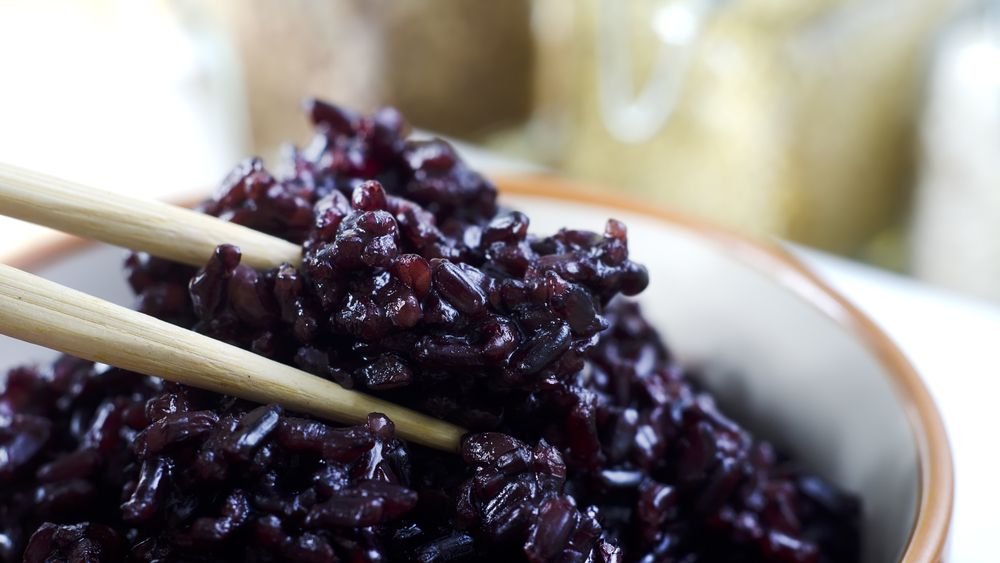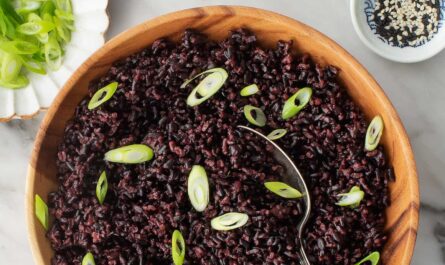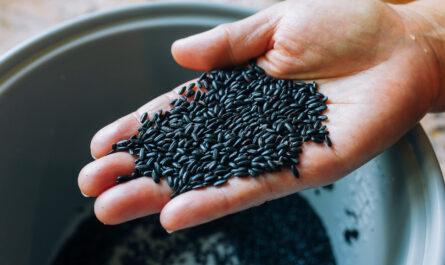When it comes to maintaining a healthy lifestyle, the food choices we make play a significant role. One such food that has gained popularity due to its numerous health benefits is black rice. Also known as ‘forbidden rice’, black rice is not only delicious but also packed with nutrients that can help manage and even prevent gut inflammation.
In this article, we will explore how black rice can positively impact your gut health, delve into its rich history, and provide some tasty ways to incorporate it into your diet. Whether you’re a seasoned sushi lover or just someone interested in improving your overall well-being, this journey into the world of black rice will be both informative and inspiring.

The History of Black Rice
Black rice has a long and fascinating history. Originating from Asia, it was once considered a luxury food reserved only for royalty. Its rich, deep color and high nutritional value made it a prized possession among ancient emperors. Today, black rice is enjoyed by people all over the world, and its availability has increased due to its growing popularity and recognized health benefits.
What Makes Black Rice Unique?
The distinct dark color of black rice is due to its high content of anthocyanins, which are powerful antioxidants. These compounds are not only responsible for the rice’s unique appearance but also contribute to its numerous health benefits, including the reduction of gut inflammation.
Understanding Gut Inflammation
Gut inflammation can occur due to various factors such as poor diet, stress, and infections. It can lead to discomfort, bloating, and more severe digestive issues if not addressed. Consuming foods that are rich in antioxidants and anti-inflammatory properties, like black rice, can help alleviate these symptoms and promote a healthier gut.
How Black Rice Helps with Gut Inflammation
Incorporating black rice into your diet can be an excellent way to combat gut inflammation. The high levels of antioxidants in black rice help reduce oxidative stress in the body, which in turn, decreases inflammation in the gut. Additionally, the rice’s fiber content aids in digestion and promotes healthy bowel movements, further contributing to gut health.
Nutritional Benefits of Black Rice
Beyond its anti-inflammatory properties, black rice is also a rich source of essential nutrients. It contains iron, which is vital for maintaining healthy blood levels, and vitamin E, an antioxidant that supports skin and eye health. For sushi lovers, adding black rice to your diet can enhance the nutritional value of your favorite dishes.
Comparing Black Rice to Other Rice Varieties
While there are many types of rice available, black rice stands out due to its nutritional profile. Unlike white rice, which is often stripped of its nutrients during processing, black rice retains its bran layer, where most of its nutrients are concentrated. This makes it a healthier choice for those looking to improve their diet and support gut health.
Incorporating Black Rice into Your Diet
There are numerous ways to enjoy black rice, from savory dishes to sweet desserts. For sushi enthusiasts, using black rice in sushi rolls can add a unique twist to traditional recipes while boosting their nutritional value. For inspiration, you can check out black rice recipes.
Simple Black Rice Recipe
Here’s a simple recipe to get you started with black rice:
- Rinse 1 cup of black rice under cold water.
- In a pot, combine the rinsed rice with 2 cups of water and a pinch of salt.
- Bring the mixture to a boil, then reduce the heat to low and cover the pot.
- Let the rice simmer for about 30-35 minutes, or until the water is absorbed and the rice is tender.
- Fluff the rice with a fork and serve as a side dish or as a base for your favorite meals.
This simple method of preparing black rice can be adapted to suit your taste preferences and dietary needs.
Black Rice and Sushi
For those who love sushi, incorporating black rice can add both flavor and nutrition to your rolls. The nutty taste and chewy texture of black rice make it an excellent alternative to traditional sushi rice. Plus, it’s a great way to impress your friends and family with a unique and healthy twist on a classic dish.
To learn more about making sushi with black rice, visit black rice and vitamin B.
Potential Side Effects and Considerations
While black rice is generally safe for consumption, it’s essential to be aware of potential side effects. Individuals with rice allergies should avoid consuming black rice. Additionally, those with specific dietary restrictions should consult with a healthcare professional before making significant changes to their diet.
Consulting with a Health Professional
If you’re considering incorporating black rice into your diet for its potential to reduce gut inflammation, it’s always a good idea to consult with a healthcare provider. They can provide personalized advice based on your individual health needs and ensure that you’re making the best dietary choices for your gut health.
Conclusion
In conclusion, black rice offers a range of health benefits that make it a valuable addition to any diet, particularly for those concerned about gut inflammation. Its rich history, nutritional profile, and versatility in recipes make it a food worth exploring and enjoying. Whether you’re a sushi lover or simply looking to improve your overall well-being, black rice can be a delicious and nutritious part of your journey to better health.
For more information on the health benefits of black rice, visit WebMD.

FAQs
1. Is black rice gluten-free?
Yes, black rice is naturally gluten-free, making it a suitable option for individuals with gluten sensitivities or celiac disease.
2. Can black rice be used in desserts?
Absolutely! Black rice can be used in various dessert recipes, such as puddings or sweet rice dishes, adding a unique flavor and nutritional boost.
3. How does black rice compare to white rice in terms of nutrition?
Black rice is more nutrient-dense than white rice, as it retains its bran layer, providing higher levels of antioxidants, fiber, and essential nutrients.
This article contains affiliate links. We may earn a commission at no extra cost to you.




